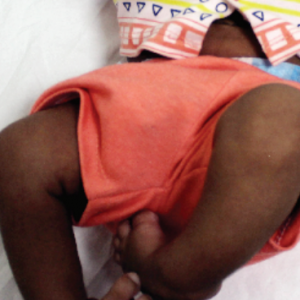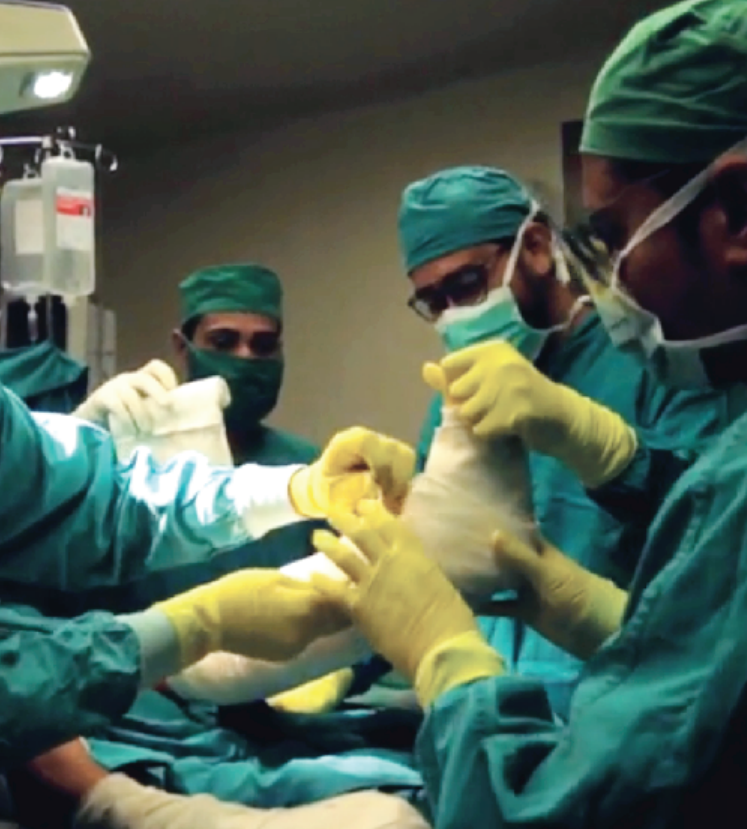Impact
Giving back gives back. Offering a path to a better life
For Mubeen, being born with bilateral clubfoot residing in Bhakkar, Punjab, life was not exactly easy. His parents were constantly reminded about their child’s abnormality and how he would never be able to live a normal life. When Mubeen was 40 days old his parents embarked on an 18-hour long journey to Karachi with his two sisters with the sole purpose of finding treatment for their child.
After searching, the found that Mubeen could be treated by doctors at the Indus Hospital, free of cost. In Karachi, Mubeen’s father found a job that paid Rs. 11,000 monthly, but it soon became difficult for the family to afford to live in a big city. When Mubeen’s treatment reached the braces phase, the family decided to move back home.
Mubeen’s father recalls the surprise and wonder on the faces of village people when they saw the improvement in his condition. “After this Mubeen and I would travel to Karachi every three months,” he says. Though the journey was long and exhausting and the fares high, he made sure to bring his son to every appointment.

On the day of completion of his treatment in September 2019, Mubeen’s mother said she wished to donate to The Indus Hospital which she had collected over the years. “This institution has helped my family and me through a very rough time. I feel it is my responsibility to do whatever we can to pay them back,” adds Mubeen’s mother. Mubeen’s father is thankful to The Indus Hospital and its staff which was very cooperative with us during this difficult time.
Smashing stigmas:
Dealing with mental health in Pakistan
At the age of 16, Maheen was married. But the first few months of marriage were anything but rosy. Two months after her wedding day, she was subjected to physical abuse from her husband. Four years later she was diagnosed with tuberculosis and moved back to her father’s place and underwent TB treatment. After nine months of treatment, Maheen was declared TB free.
But in a cruel twist of fate, 20 days later she was re-diagnosed, this time with a more severe form of drug-resistant TB. She returned to live with her husband. The continued abuse and stress took a toll on her health resulting in her not being able to take care of herself.
Turning to her father, whom she thought could provide a safe space, away from the abuse and stress of her married life, Maheen found no relief, as her father also sided with her husband and asked her to return to him.
Feeling trapped from every side, she began to lose interest in people and activities happening around her and would starve and isolate herself, and eventually stopped communicating at all.
In May 2017, Maheen was enrolled in the Psychosocial Support Interventions (PSSI) Program after an initial visit by the Community Mental Health Officer (CMHO) and was found to be suffering from anxiety and depression, and was offered mental health counseling.
When she took up the offer, she was met with criticism from her father, who blamed her for the situation she was in.

Once, again the feeling of being “not good enough” and doom started engulfing her and she considered discontinuing counseling and isolating herself again.
When the counselor became aware of her situation, she proceeded to counsel both Maheen and her father, who cleared up misconceptions surrounding TB, its treatment, and even helped the young woman to restart her counseling sessions.
Two sessions later, Maheen’s father saw a significant improvement in his daughter’s condition and decided that he would not force her to return to her husband until her treatment was completed. The support of her father was a big step in Maheen’s life towards a normal life as she started to become more sociable and even picked up a hobby – stitching. More importantly, her relationship with her family improved.
Maheen now lives with her family and works in a garment factory as a quality checker.
Healthcare for All, Everywhere
In the vast fields of the Rajanpur District in Punjab lies a village called Kacha Razi. Here, like in many other areas in interior Pakistan, healthcare facilities are scarce. Basic healthcare like maternal care here is relegated to those who live in the village and supplies are scarce for their needs. For Naziran Mai this lack of access proved detrimental.
Naziran Mai gave birth to her first child in her home in the village, with a traditional birth attendant. Upon the birth of her second child, due to a lack of proper antenatal care, Naziran Mai lost the baby. This delivery took a mental and physical toll on Naziran Mai. The lack of hygienic equipment and excess blood loss during delivery caused Naziran to develop an infection.

Upon the conception of her third child, Naziran was determined to be assessed by a doctor and have clinical services at the time of her child’s birth. To Naziran Mai’s benefit, the Indus Hospital’s healthcare services in Bhong had started providing the maternal services which Naziran could avail for free.
At this facility, she attended antenatal checkups and was immunized for Tetanus for the first time. Naziran Mai recently gave birth to a healthy baby girl, attended by the hospital’s midwives. The baby was vaccinated at birth and sent home with a care package to keep her clean and warm.
Catching our breaths again: Indus PuRe program
The PuRe program at The Indus Hospital delivers high-quality treatment for eligible breathless patients with chronic respiratory disease. The program also remotely monitors all patients at high risk of not being able to attend the on-site location. It was specifically introduced to improve the health and quality of life for these patients by reducing the burden of exacerbation of the respiratory disease.
Mohammad Sarwar was a patient enrolled in this program. A regular day for this 50-year-old included driving around the city of Karachi in search of passengers in his rickshaw. The city of Karachi, where the wind can be brisk, full of dust and pollution, where the sun barrels down on its occupants subsiding and returning eternally – life with the respiratory disease was intensely difficult for M.S.
His major source of income was hindered as he suffered breathing issues while trying to drive his rickshaw. Sarwar’scondition was as such that even something as basic as walking for 90 meters would be a huge task as he would have to stop several times to catch his breath before he could walk again.
After only six weeks in the PuRe Program, Sarwar could see signs of improvement in his health. Coupled with improvements in his physical strength, his walking distance improved from 224m to 320m in six minutes.
Many times, the simple act of breathing is taken for granted. Human bodies rely on this activity constantly and The Indus Hospital is making great strides in providing respiratory healthcare by ensuring that everyone who cannot is allowed to catch their breath again.
Differently-abled but not un-able
In 2012, when Usman was in 10th grade – tragedy struck him and his family. Usman was a part of a brutal traffic collision which resulted in irreparable damage to him and the loss of one of his limbs.
Usman’s life changed dramatically after his surgery. His dreams, educational endeavors, and goals were all subject to who his care was dependent upon. Even indoor mobility was highly restricted for Usman unless he had help.
Usman’s physical condition was a heavy burden on his mental state, he became less sociable and isolated himself. With the hindrances in his mobility, he was unable to continue his education and Usman became disconnected. It was very difficult for him to cope with the immense changes not just in his lifestyle but also in his environment. His loss was felt by everyone who surrounded him, they pitied his state as a disability.
Usman’s family was referred to Indus Hospital by someone with the direction that he would be able to find free treatment there. Usman was taken to the rehabilitation facility at the Tehsil Headquarter Hospital, Bedian Road, Lahore. At the hospital, Usman was provided with a new artificial limb which was available for fitting within a week.
The limb provided Usman with a new sense of independence. He was no longer dependent on anyone for his mobility.
His joy, excitement, and eagerness to become independent were evident throughout his process of rehabilitation. After only a few weeks of gait training, he was able to walk again. Usman was allowed a new and different life, but for him to succeed on his own, and, he has. He restarted persuing his studies and is now a Pharmacy B Tech. Besides his studies, he helps his father in the fields and works in a factory as a part-time employee. Apart from his education and work Usman also plays cricket, badminton, and arm wrestling — making the very most of his new life.




